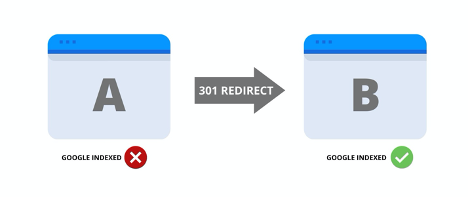Navigate SEO Like a Pro: Leveraging 301 Redirect for Improved Site Efficiency
Navigate SEO Like a Pro: Leveraging 301 Redirect for Improved Site Efficiency
Blog Article
Rise Organic Traffic by Taking Advantage Of the Potential of 301 Redirects for SEO
When it involves optimizing a web site for search engines, the tactical usage of 301 redirects can significantly affect natural website traffic growth. These long-term redirects play a critical role in guiding both individuals and internet search engine bots to the best pages, settling web link equity, and boosting total site authority. By understanding the ins and outs of 301 redirects and applying them effectively, businesses can unlock the full capacity of their SEO methods. Yet, the subtleties of redirect monitoring, paired with the ever-evolving search landscape, call for a thorough approach to ensure success.
Comprehending 301 Redirects Basics
When embarking on the trip to understand 301 redirects, it is vital to understand the fundamental concepts that underlie this essential element of web site optimization. A 301 redirect is a long-term redirect from one URL to another. It educates internet search engine that the initial URL has transferred to a new location, moving the search engine optimization value from the old link to the brand-new one (301 Redirect). This procedure makes sure that individuals and search engines are routed to the most appropriate and current web page, improving customer experience and preserving SEO positions.
Additionally, using 301 redirects correctly can prevent customers from encountering 404 errors, improving the general use of the internet site. Understanding the basics of 301 redirects is foundational for any SEO technique aiming to enhance web site presence and use while keeping search engine positions.
Applying Redirect Approaches
To efficiently enhance site performance and customer experience, critical execution of redirect methods is vital in enhancing online visibility. 301 Redirect. When applying redirect methods, it is important to have a clear plan in place to make certain a smooth shift for both online search engine and users. Begin by recognizing the web pages that need to be redirected and one of the most suitable redirect type to make use of, such as 301 redirects for long-term moves or 302 redirects for short-term modifications
Regularly upgrading and reviewing redirect techniques as needed is necessary to maintain a healthy internet site and make the most of organic web traffic. By carrying out redirect approaches effectively, websites can improve their SEO performance and offer a much better individual experience.
Preventing Typical Redirect Mistakes
One crucial element in preserving a seamless internet site transition during redirect execution is steering clear of usual redirect errors. Additionally, stopping working to establish up appropriate redirects for both the www and non-www variations of a web site can divide link equity and create indexing issues. By avoiding these usual redirect mistakes and performing extensive screening post-implementation, site proprietors can effectively improve their Search engine optimization strategies and drive natural website traffic growth.
Tracking Redirect Efficiency
Making sure the performance and efficiency of carried out redirects entails closely monitoring their efficiency to determine their influence on user experience and search engine optimization efforts. Tracking the efficiency of 301 redirects is essential in figuring out if they are efficiently directing web traffic to the designated location. Making use of devices like Google Analytics can provide important insights into the web traffic circulation prior to and after applying redirects. Keeping track of the organic web traffic, bounce prices, and time invested on the rerouted web pages can aid assess whether the redirects are meeting Visit This Link their designated goals. In addition, routinely inspecting for any kind of mistakes or concerns that might arise with the redirects is necessary to quickly deal with and remedy them. By continually monitoring redirect performance, website owners can make data-driven Read Full Report decisions to optimize their SEO techniques and improve the overall customer experience, inevitably leading to enhanced natural website traffic and internet search engine positions.

Leveraging Redirects for SEO Development
Redirects play a critical role in improving the search engine optimization (SEARCH ENGINE OPTIMIZATION) growth of a web site by strategically assisting user web traffic in the direction of relevant material. Leveraging redirects effectively can substantially impact a web site's presence and ranking on online search engine results web pages (SERPs) When executing redirects for search engine optimization growth, it is necessary to focus on protecting web link equity by redirecting old URLs to brand-new, relevant pages. By doing so, internet search engine are more likely to connect the authority and importance of the old page to the new location, favorably impacting the overall SEO efficiency. In addition, utilizing 301 redirects can help combine web link signals and prevent content replication concerns, which can dilute SEO initiatives. Additionally, leveraging redirects for search engine optimization development involves monitoring and updating them regularly to guarantee they remain to offer their intended function successfully. Regularly reviewing the efficiency of redirects and making essential adjustments based on analytics and search engine optimization ideal techniques is key to driving site web continual natural website traffic development.
Conclusion
Finally, implementing 301 redirects can significantly benefit natural web traffic development by successfully guiding individuals to pertinent material. Understanding the essentials, executing redirect strategies, staying clear of common blunders, and monitoring efficiency are important steps in leveraging redirects for search engine optimization development. By using 301 redirects successfully, sites can boost their online search engine rankings and give a much better customer experience, eventually bring about enhanced natural web traffic.

Monitoring the organic website traffic, bounce rates, and time spent on the rerouted pages can help assess whether the redirects are satisfying their desired goals. When implementing redirects for SEO development, it is vital to concentrate on preserving link equity by redirecting old Links to brand-new, relevant pages. Comprehending the fundamentals, applying redirect strategies, avoiding typical errors, and checking performance are essential steps in leveraging redirects for SEO growth.
Report this page